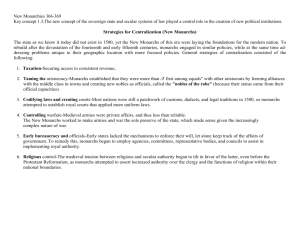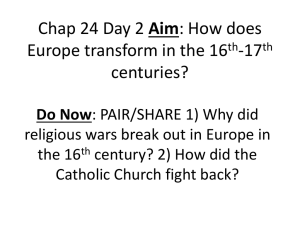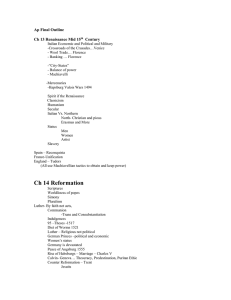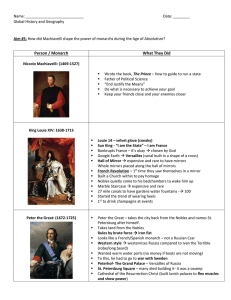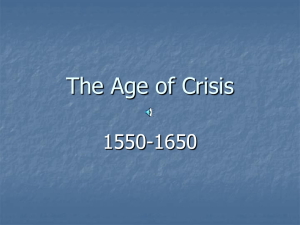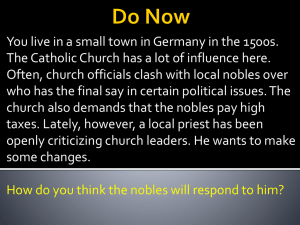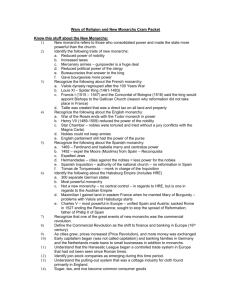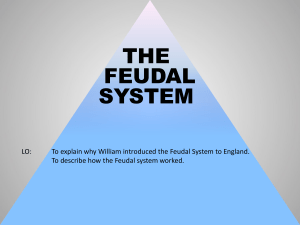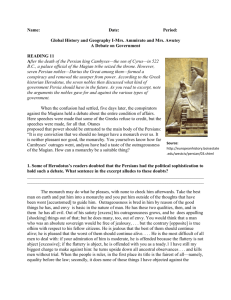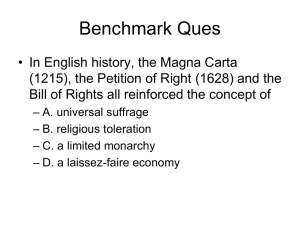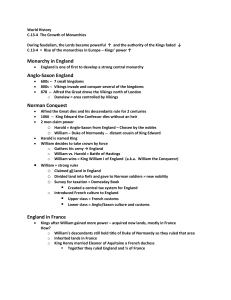New monarchs - krayhistory
advertisement
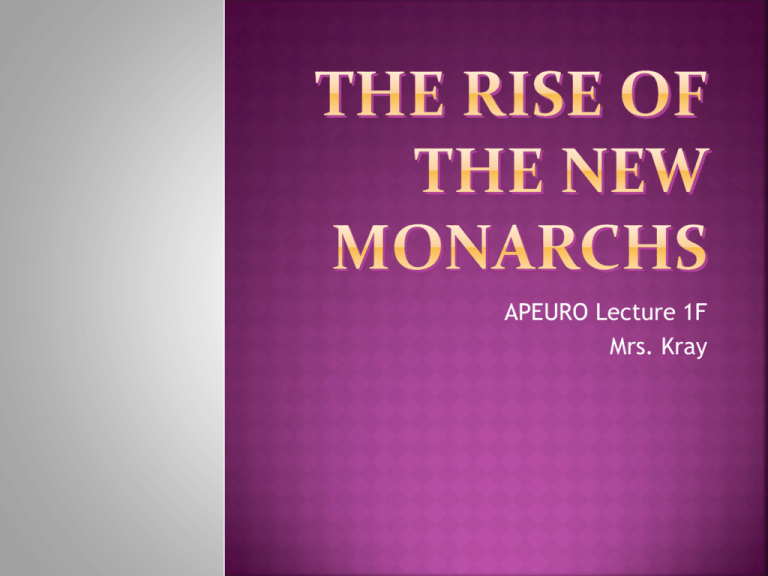
APEURO Lecture 1F Mrs. Kray Manual for a realistic ruler Considered first work of political science Some say “The Prince” was Ferdinand of Aragon Good government provided justice, law, and order The ends justify the means Patriotic appeal for a free & united Italy “It is much more safe to be feared than to be loved, when you have to choose between the two.” Taming the aristocracy (nobles of the sword) Offered the institution of monarchy as a guarantee to law and order Develop a consistent stream of revenue through taxation Break down the mass of feudal, inherited, customary, or “common” law in which the rights of the feudal classes were entrenched. The kings would MAKE law, enact it by his own authority, regardless of previous custom or historic liberties What pleases the prince has the force of law! Make armies and war the sole preserve of the state Develop bureaucracies to enforce royal authority No more private armies Staffed with members of the middle class (nobles of the robe) – did not happen in Eastern Europe Maintain religious control over clergy and the functions of religion within their national boundaries Hundred Years’ War Severe financial burden Nobles had built up private armies War of the Roses Civil war between two factions of nobles Devastated England Many people were killed; food wasn’t grown; the wealthy spent money on weapons & soldiers House of Lancaster (Red Rose) House of York (White Rose) Richard III First Tudor King Tamed the nobles reduced the number of dukes from 9 to 2 Ended livery and maintenance – no private army Established Star Chamber New system of courts to deal with property disputes and infractions of public peace Operated without a jury Built England’s first navy The Hundred Years’ War had left France devastated Experienced 100 years of warfare on its soil Burgundy aimed to replace French leadership on the continent Feared encirclement by Habsburgs Louis XI “The Spider” (1461-1483) Built up royal army, suppressed brigands, and subdued rebellious nobles Added new territory to the royal domain through strategic marriages & by conquering part of Burgundy Francis I (1515-1547) Concordat of Bologna gave king control of French clergy through an agreement with the pope Established taxation with taille (direct tax) and gabelle (salt tax) Claimed lands in Italy There was no Spain Complete the Reconquista of the Moors who occupied the southern part of the Iberian Peninsula Establish a national identity in a diverse kingdom Their marriage united the 2 largest provinces in Spain (Aragon & Castile) Made alliances with towns (hermandades) to establish law and order Completed the reconquista Established strict religious orthodoxy Spanishness linked to sense of Catholicity Spanish Inquisition Jews expelled 1492 Sponsored voyages of exploration Spain emerged as the strongest nation in Europe Charles V inherited the Spanish throne, became the most powerful monarch in Europe 3 kinds of states Princely states Ecclesiastical states run by a bishop or abbot Large portion of the Empire consisted of these church states Imperial free cities each one had a little hereditary dynastic monarchy Saxony, Brandenburg, Bavaria, Bohemia, Palatine, etc. Approximately 50 Not large but dominated commercial and financial life Emperorship was an elective office 7 electors: 4 princely lords, 3 ecclesiastical lords (Palatine, Saxony, Brandenburg, Bohemia, Mainz, Trier, Cologne) 1452 electors chose Archduke of Austria as emperor, he was a Habsburg 1452-1806 – Habsburgs consistently get selves re-elected 1519 – Elected Holy Roman Emperor and became symbolic head of Germany Most powerful ruler of his day Contemporaries feared that Europe was threatened with “universal monarchy” A kind of imperial system in which no people could preserve independence from Habsburgs This is France’s great fear Because emperorship was an elected office German states over the centuries had prevented the emperor from infringing upon their local liberties Extracted concessions before election Made centralizing gov’t power almost impossible Fears of a universal Habsburg monarchy encouraged countries like France to interfere in German affairs to keep the area politically divided Charles V battled numerous enemies during the course of his reign Ottoman Turks’ siege of Vienna, Habsburg-Valois Wars, Algerian pirates, German Lutherans
